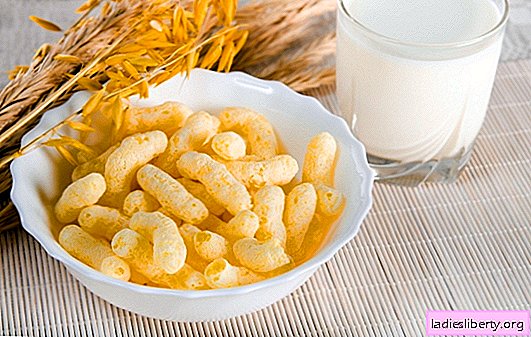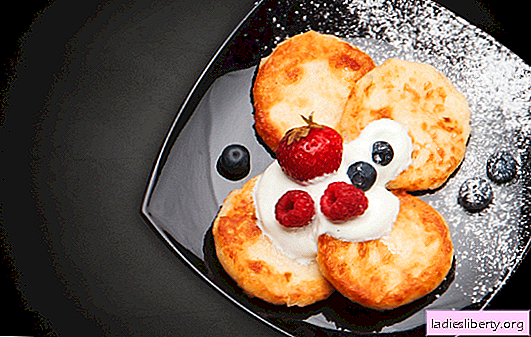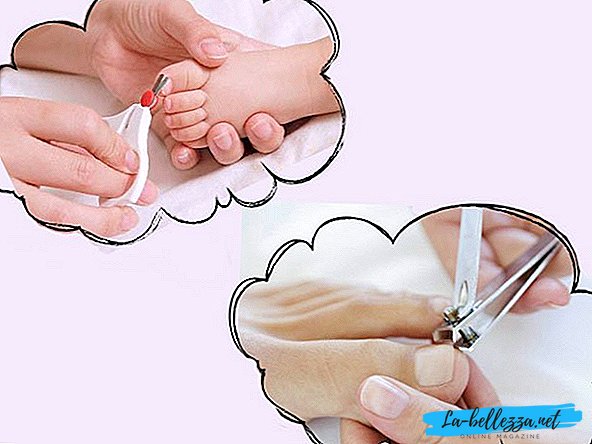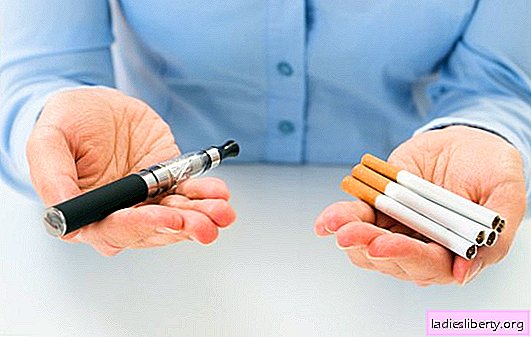
Crispy airy delicacy, corn sticks, are not as simple as they might seem at first glance. They interestingly combine both some harm and bright benefits.
How production technologies affect the benefits of corn sticks
The technology for making corn sticks is unique and has nothing to do with the production of another airy goodies from maize - popcorn, or any sweet pastries from cornmeal.
Actually, what is crushed corn grains for making sticks, it is more correct to call cereals, not flour. Since the product assortment is wide, and there are sticks not only in powdered sugar, but also in chocolate icing, with fruit flavors, as well as unsweetened ones, salted, with the taste of bacon, cheese and other things, the list of ingredients is long.
But in any case - the whole mass passes through a special device - an extruder.
It is somewhat reminiscent of a meat grinder, only from it, after exposure to high temperatures and pressure, a special batch, a plastic fluffy foam comes out of corn grits, cut into pieces, which are then sent to the dryer, then to the last additives for taste and aroma, and then already packing.
High-quality corn sticks literally melt in your mouth, if the delicacy "sand" crunches on your teeth and it is difficult to chew for a long time, it means that there were violations in the technology of its preparation and the manufacturer did not stint on low-grade additives.
We note, by the way, that at home corn sticks need to be stored dry and not with products with strong smells - they can absorb them.
Corn sticks are eaten just like that, washed down with tea and coffee, juices, from which you can collect simple cakes and cakes, for example, Anthill.
Considering the useful properties of products, it is logical to take into account the beneficial properties of their main ingredients, but in the case of corn sticks, this rule almost does not work. The fact is that production technology significantly affects the quality of corn grits. In particular, amino acids and most vitamins are destroyed, except for those resistant to high temperatures B2 and PP, which are significant for the following:
good vision and protection of the eyes from the ultraviolet radiation of the sun;
protect the nervous system from stressful overloads;
maintaining smoothness and elasticity of the skin;
normal protein metabolism;
saturation of cells and body tissues with oxygen.
There are also corn sticks and minerals - magnesium, phosphorus, sodium, zinc and manganese, and even if their content is low, they mutually reinforce each other.
But corn starch in the product almost does not lose, on the contrary, it is easier to digest, its value in the body is explained, at least, by its significance for lowering cholesterol and mild bile and diuretic properties.
Also, in this delicacy, a significant share of the benefits of corn for the cardiovascular system and the hematopoietic system (acceleration of hemoglobin synthesis processes) remains.
In addition, the product is deprived of coarse fiber of corn grits and actually does not contribute to the improvement of intestinal motility, does not remove toxins and toxins.
The energy value of the product in comparison with cereals remains similar - 300-500 kcal per 100 g, but on the other hand - corn sticks are very light, and a lot of them reach the same 100 g.
When Can Corn Sticks Benefit
If the cereal porridge contains a high content of slow (complex) carbohydrates, then again, in the process of making corn sticks, this element dramatically changes its properties and turns into fast (simple) carbohydrates.
Which require a minimum of time to digest and raise blood glucose levels.
If complex carbohydrates can be stocked up almost literally for the future, then simple ones can not be dispensed with for a quick recovery of physical strength, and let such a reserve be used up quickly too, sometimes timely and powerful support of a tired organism is more important.
The carbohydrate content per 100 g of the product is significant - 58 g, which should be correlated with 6 g of protein and 28 g of fat.
Therefore, it is recommended to eat corn sticks in the morning, even for breakfast - it will invigorate the body and give energy, the main thing is not to get carried away and leave room for the main breakfast dishes.
For better digestibility, it is recommended to combine corn sticks with sour fruits and berries, as well as milk and sour-milk drinks.
How else are the benefits of corn sticks
Corn sticks as a sweet (and most of them are generously flavored with at least powdered sugar) have a very positive effect on the human nervous system.
Some researchers even compare their ability to improve mood and drive off apathy with the effectiveness of white chocolate.
Sugar again serves as a “fuel” for the brain, so corn sticks can activate mental abilities and increase concentration.
A few corn sticks, eaten shortly before the main meal, stimulate appetite, but if you eat more of them, you will quickly feel full, and hunger will recede for a long time, since a significant amount of the product, which is still increasing in the stomach, will be digested for a rather long time.
What is the harm of corn sticks
Summing up, we can say that corn sticks product is equally as harmful as useful.
And fluctuations in these two directions strongly depend on the amount of goodies eaten. Nutritionists agree that an adult will not be hurt by 1-2 handfuls of corn sticks per day, children, after reaching 3 years of age, are allowed to eat half of the adult portion.
Women during pregnancy can eat corn sticks without harming little by little and necessarily - without neglecting other products that are firmly categorized as a healthy diet.
Nursing mothers should be afraid that crunchy treats can provoke allergies and upset stomach in a child, but if you really want corn sticks, you should choose those that contain a minimum of artificial additives and eat no more than 1 handful of them per day.
Doctors do not recommend treating children under 3 years old with corn sticks, whose body is simply not adapted for such a sweet food that contains a large amount of carbohydrates, but is able to respond to it with individual intolerance, which may not occur if you wait a while with the addition of goodies in the baby’s diet.
Unlike hypoallergenic corn grits, corn sticks are a highly allergenic product that can cause deterioration in chronic dermatological diseases.
Also, traditional contraindications to their use are:
diabetes;
serious digestive tract diseases (for example, gastritis and ulcers);
pancreatitis (inflammation of the pancreas).
The high content of carbohydrates and calories, makes corn sticks harmful in terms of risks, provoking them to gain extra weight with a tendency to obesity, and also, clearly, they are harmful in strict diets with a restriction in the amount of food, which, due to corn treats, can with a significant slowdown, move along the gastrointestinal tract.











